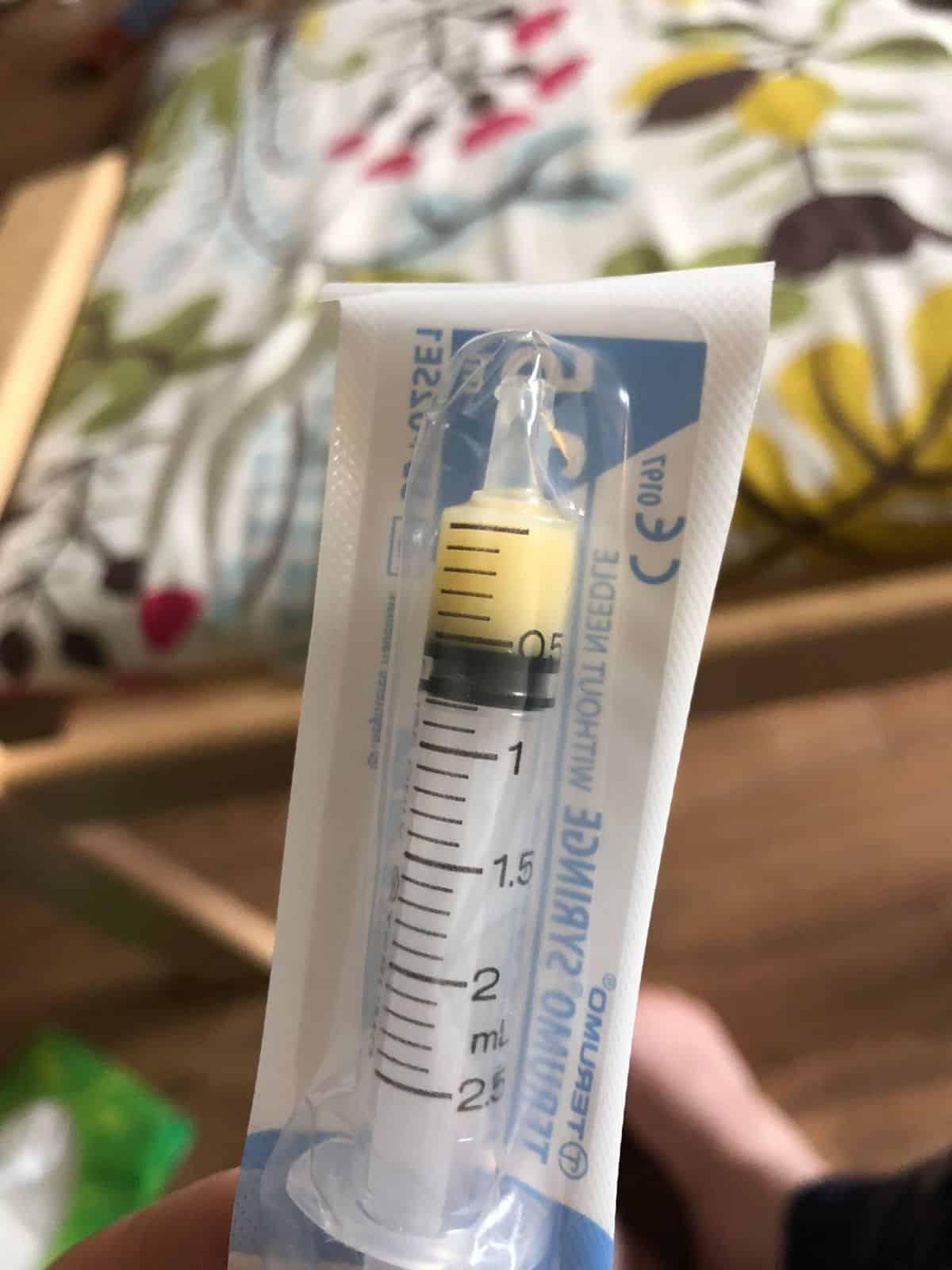Mothers start to produce colostrum (early milk) while pregnant. Being able to express colostrum is a useful skill to have. Saving your expressed colostrum may also be beneficial if your baby is likely to need special care after birth.
Why express while pregnant?
Being familiar with your breasts and how they work will give you confidence for after the birth.
- You’ll be able to express a small amount of colostrum onto your nipple if your baby needs encouragement to feed.
- You’ll be able to express colostrum for your baby if he has difficulty feeding or is cared for in the neonatal intensive care or special care baby unit.
- Being able to hand express will help you avoid problems with engorgement and mastitis.
If your baby doesn’t breastfeed well in the first few days, being able to hand express will help you:
- Express your milk if needed.
- Provide your own milk for your baby to prevent or treat conditions such as low blood sugar or jaundice.
- Avoid the need to give infant formula.
Special circumstances
Learning to hand express while pregnant, and collecting and saving the colostrum can be helpful in some special situations, including:
Planned caesarean or induced birth Consider expressing the day before birth so your milk is available if you and your baby are separated. This will be especially useful if your baby will be born early.
Babies with a cleft lip or palate This may be diagnosed during pregnancy. Babies with any form of cleft can find it harder to breastfeed. Breastfeeding is particularly important for the first six months as it helps protect these babies against ear and respiratory infections. When the cleft is repaired, your milk helps promote healing and protects your baby against hospital germs.
Mothers with diabetes In the first 24 hours after birth, babies of diabetic mothers risk developing low blood sugar levels (hypoglycaemia). A baby needs colostrum to maintain his blood glucose levels. Exclusive breastfeeding has been shown to reduce the risk of a baby developing diabetes later in life.
Mothers with breast abnormalities or who have had breast surgery Stored colostrum can be helpful if you encounter problems establishing milk production.
Other medical conditions Some medical conditions may make it harder for you and your baby to establish breastfeeding. Or, if you need to start medications that are incompatible with breastfeeding, your saved colostrum can still be given to your baby.
Talk to your midwife
Some NHS hospital trusts already have policies in place for sharing information on antenatal expression. Your midwife and other members of your antenatal care team may have information to share on breast massage and how to hand express. They should also be able to give you small sterile syringes with identity labels in which to save your colostrum.
Do ask if the hospital has an Infant Feeding Specialist who will be well informed about breastfeeding and a source of support in those early days.
A handy technique
Hand expression is a useful technique to learn even though most mothers find they rarely need to express and store their milk. It is effective, convenient and free. You may also find you can express more milk by combining hand expression with pumping than using just a pump.
When to start expressing
Is it safe?
Don’t worry – following the suggestions to express for a few minutes each day is unlikely to trigger labour. Check with your midwife if you are at risk for early labour. If you experience any uterus cramps when expressing, stop immediately and contact your midwife.
Expressing during pregnancy 
- It helps to be warm and relaxed.
- You could practise in the bath or shower at first. When you start collecting colostrum, express after a bath or shower.
- Wash your hands.
- Massage your breasts to help milk flow.
- Hand express from one breast. Take care NOT to cause pain or discomfort.
- You are likely to see small droplets or drips of colostrum appear as you express. Express directly into the container so you save every precious drop. If you’ve been given syringes and find it difficult to collect your colostrum, express into a small clean container (e.g. cup) and draw the colostrum up into the syringe.
You can express up to three times in the same day. If you plan to express again that day, store the syringe in the coldest part of the fridge. This is usually at the back.
Once you’ve expressed for the last time that day, seal the syringe in a bag. Label and date it before placing it in the freezer. The colostrum could be kept in the fridge if you’re going to be induced or have a planned caesarean section within a day or two. Fresh colostrum inhibits the growth of bacteria and can be safely refrigerated for 48 hours.
Why hand express?
Hand expression is the best way to express colostrum. It is simple to learn and gets easier with practice. You’ll only be expressing small amounts so using a pump will be impractical and may not be as effective. You may receive information and a demonstration on hand expression from your midwife.
Our article Hand Expression of Breastmilk also describes an effective method. Antenatally, you’ll only need to express for three to five minutes – just until you have a few drops of colostrum. It may not seem very much, but a baby’s first feed is no more than a teaspoon of colostrum. By expressing up to three times in a day, you can express enough for a feed. With practice and regular stimulation, you’ll be able to express more colostrum.
When you go into labour
Take your stored colostrum with you to the hospital in a cool bag. The hospital can arrange to keep your colostrum frozen, possibly in the special care baby unit. Make sure you or your birth partner makes a note of where it is stored and that details are in your notes.
If you and your baby are likely to have difficulties or be separated, one of the containers can be defrosted once you’re close to birth. This is then ready for the first feed, if needed.
When baby arrives
Your baby will need to breastfeed at least 8-12 times in 24 hours. If, for any reason, you are separated or unable to breastfeed your colostrum can be defrosted if needed, one container at a time to avoid waste. Your colostrum can also be used if your baby needs supplements.
The first few days
Frequent breastfeeding and keeping your baby close by will help establish your milk supply and get breastfeeding off to a good start. If you and your baby are separated, express milk eight times in each 24 hours including at least once at night, until your baby is able to breastfeed. Expressing as well as breastfeeding is important if your baby isn’t feeding well, or needs supplements for any reason. This will help establish milk production and provide milk for your baby’s next feed if needed. For any problems, seek skilled help from an LLL Leader – check our website for details.
Written by Karen Butler, Sue Upstone & mothers of La Leche League GB.
Updated February 2022
Further Reading Beginning Breastfeeding Caesarean Birth and Breastfeeding Comfortable Breastfeeding Diabetes and Breastfeeding Hand Expression of Breastmilk Is My Baby Getting Enough Milk? Jaundice in the Healthy Newborn My Baby Won’t Breastfeed Sleepy Baby – Why and what to do
LLLI Stories Cleft Lip & Palate Breastfeeding Books The Womanly Art of Breastfeeding LLLI. London: Pinter & Martin, 2010 Breastfeeding Answers Made Simple. Mohrbacher, N. Amarillo, Tx: Hale Publishing, 2010.
References
Cox, S. An ethical dilemma: should recommending antenatal expressing and storing of colostrum continue? Breastfeeding Review 2006; 14(3):11-6. Cox, S. Expressing and storing colostrum antenatally for use in the newborn period. Breastfeeding Review 2006; 14(3):11-6. Oscroft, R. Antenatal expression of colostrum. Pract Midwife 2001;4 (4): 32-5. Forster, D. et al. Diabetes and Antenatal Milk Expressing (DAME). Lancet, 2017; 389 (10085): 2204-2213.
This information is available to buy in printed form from the LLLGB Shop

